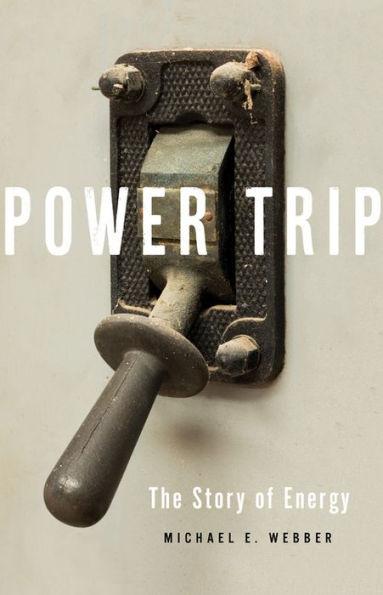
HISTORY/ENERGY
Michael E. Webber
Power Trip: The Story of Energy
Basic Books
Hardcover (also available as an e-book and audiobook), 978-1-5416-4439-7, 304 pgs., $30
May 7, 2019
Power Trip is a timely book that persons of power in government, science, and business would do well to read and consider. It can inform and empower other readers, also.
Michael E. Webber’s new work offers eye-opening looks at how our numerous energy sources—renewable and nonrenewable—are helping us push civilization forward to new, more innovative levels. Yet, at the same time, the survival of life on Earth now hangs in the balance as economic, environmental, political, and military forces around the world fight each other over which forms of energy—polluting or nonpolluting—should dominate in each country or region.
Webber has excellent credentials for discussing how “energy is the single most important opportunity in the world and also its most important problem.” A specialist in energy resources, he is a mechanical engineering professor at the University of Texas at Austin, as well as chief science and technology officer for a global energy and infrastructure services firm, Engie.
We now face “vast energy inequity,” he emphasizes. “The average worldwide citizen consumes half the energy of a British resident, who consumes half the energy of an average American, who consumes two-thirds the energy of a typical Texan.”
Webber’s well-written book starts at the heart of energy: how it is difficult to define, and how “[w]e cannot make more of it; we can only move it around and transform it.” From there, he expands outward to how harnessed energy makes possible the “end-uses and benefits” we all seek, including “water, food, transportation, wealth, cities, and security.”
Water, for example, is vital to energy’s story in many different ways, the author emphasizes. “Ensuring access to water is the first priority for individuals and societies because water is so critical to life.” Our bodies need it survive, and we need it to produce food. Yet, water also can be harnessed to provide energy, in a simple water wheel, at a hydroelectric dam, or even in a nuclear power plant, where moving water provides both cooling and the steam that drives turbines to turn generators and produce electricity.
Power Trip offers readers a wealth of energy anecdotes, statistics, and other details. For example: “Air conditioning is now so common that it is the single biggest driver of peak electricity demand in hot climates,” Webber points out. “In a place like Texas, almost half of the power consumption statewide on a hot summer afternoon comes from air conditioning.”
While Texas gets several energy-hog mentions, the book’s focus is global. Indeed, the author delves into a wide swath of topics, such as: energy’s role in starting wars and producing products and pollutants; why more freight trains and fewer long-haul trucks are needed; how to create energy-smart cities; and why nations must move quickly to adopt cleaner and more renewable energy sources.
Webber provides several calls to action that citizens, scientists, leaders, and others can respond to, if they are willing to expend some personal energy, plus new thinking. “Adopting a cleaner suite of options while increasing energy access and letting go of our dirtier past is our critical path forward.”
As Deputy Director of the Energy Institute, Co-Director of the Clean Energy Incubator, Josey Centennial Professor in Energy Resources, and Professor of Mechanical Engineering, Dr. Michael E. Webber trains the next generation of energy leaders at the University of Texas at Austin through research and education at the convergence of engineering, policy, and commercialization.
Webber has authored more than four hundred publications, holds six patents, and serves on the advisory board for Scientific American. A successful entrepreneur, Webber was one of three founders in 2015 for an educational technology startup, DISCO Learning Media, which was acquired in 2018 by Probility Media. He was honored as an AT&T Industrial Ecology Fellow on four separate occasions by the University of Texas for exceptional teaching.
His latest book Power Trip: The Story of Energy was published May 7, 2019 by Basic Books with a 6-part companion series in development for PBS. His first book, Thirst for Power: Energy, Water and Human Survival, which addresses the connection between Earth’s most valuable resources and offers a hopeful approach toward a sustainable future, was published in 2016 by Yale Press. It received wide praise and was converted into a one-hour documentary by Alpheus Media. He lives in Austin, Texas.
